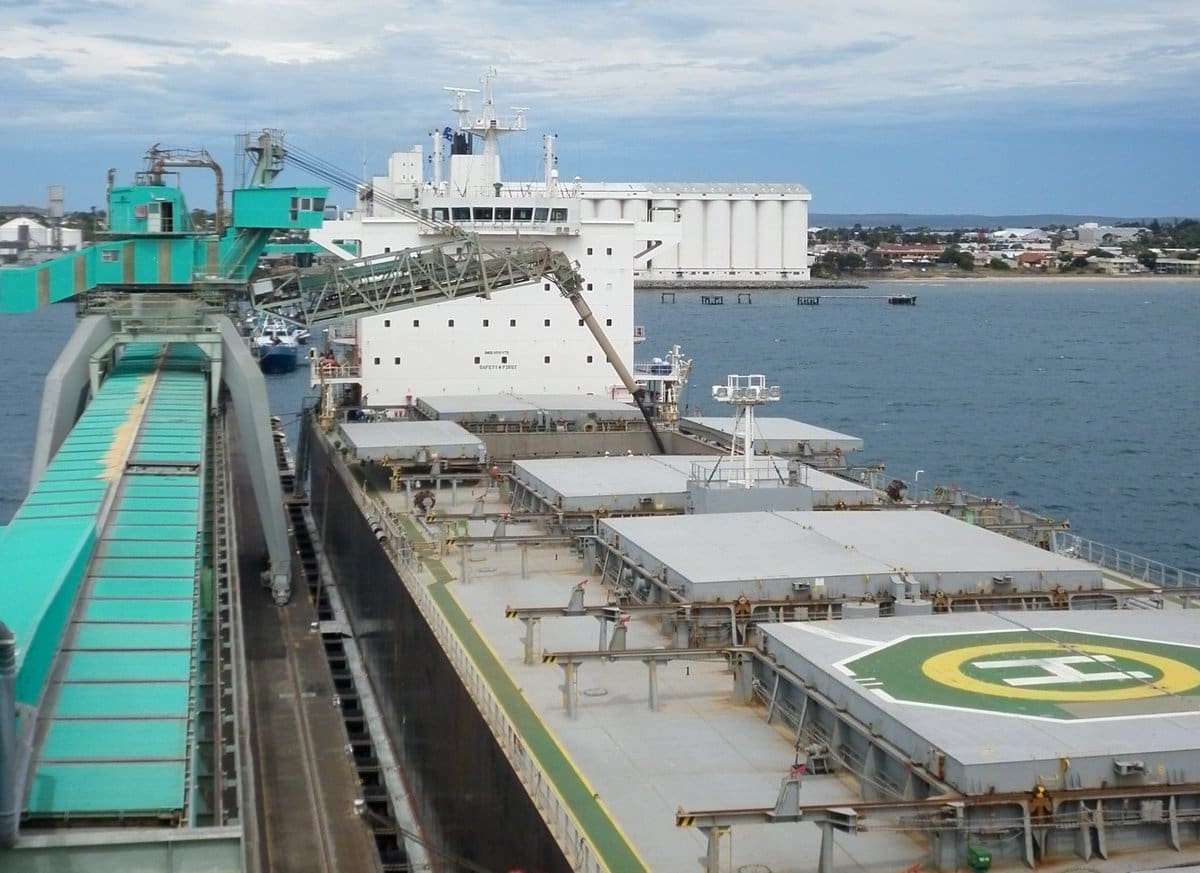
South Australian bulk handler, Viterra, loads a cargo of canola at its Port Lincoln terminal.
THE Australian Competition & Consumer Commission (ACCC) has determined not to exempt the services provided by Viterra at its Port Lincoln and Thevenard facilities from parts of the Port Terminal Access (Bulk Wheat) Code.
The decision means that Viterra will continue to be subject to the non-discrimination requirements of the code at its Port Lincoln and Thevenard terminals, and must also provide access-related dispute resolution processes for exporters.
Viterra will also continue to require ACCC approval for any changes made to its capacity allocation systems, and must publish certain information about expected capacity and bulk grain stocks held at these port terminals.
“After looking at the South Australian grain industry and latest shipping data in detail, we consider that Viterra doesn’t currently face sufficient competition at its Port Lincoln and Thevenard facilities to justify removing certain protections for independent exporters seeking to export wheat through these ports,” ACCC deputy chair Mick Keogh said.
“We acknowledge that T-Ports’ Lucky Bay operation now provides an alternative export pathway for certain areas of the Eyre Peninsula, particularly the eastern section.
“However, at this time we consider that the higher level of protections for exporters under the code is needed to ensure they can continue to gain fair and transparent access to Viterra’s facilities.
“We believe that not exempting Port Lincoln and Thevenard will deliver the best outcomes for growers and the industry at this point in time.”
ACCC said it will continue to closely monitor competition as the market changes.
Under the Bulk Wheat Code, Viterra is also required to deal with exporters in good faith, publish a port-loading statement and loading procedures, and make standard terms and reference prices available in relation to all of its port-terminal facilities.
Viterra made applications to be exempt from Parts 3 to 6 of the Code at all six of its South Australian port terminals in July 2019.
In April 2021, the ACCC made final determinations exempting Viterra’s Inner Harbour and Outer Harbor facilities in Port Adelaide where there is more competition, but determined not to exempt Viterra’s Port Giles and Wallaroo facilities due to lower levels of competition.
The ACCC’s final determinations are available at Viterra wheat port exemption assessment.
Given recent changes in the Eyre Peninsula port terminal-services market, the ACCC considered the peak period of the 2020-21 shipping season to be of particular relevance to its assessment of Viterra’s Port Lincoln and Thevenard exemption applications.
As such, the ACCC separated its final determinations for Viterra’s Port Lincoln and Thevenard facilities from its consideration of other South Australian ports to consider new information relevant to these assessments.
Background
The Port Terminal Access (Bulk Wheat) Code of Conduct (the Code) commenced on 30 September 2014 and regulates port terminal service providers to ensure that exporters of bulk wheat have fair and transparent access to port terminal facilities.
Where appropriate, the ACCC may determine a service provider to be exempt from having to comply with Parts 3 to 6 of the Code in the course of providing services from the specified terminal.
In making its determination, the ACCC is required to have regard to the matters listed at subclause 5(3) of the Code which include: the interests of exporters and the service provider; whether the service provider is an exporter (or associated with an exporter); the presence of other exempt service providers in the area; and competition in upstream and downstream markets.
Obligations under Parts 3 to 6 of the Code include:
- not discriminating in favour of an associated exporter or hindering exporter access to terminal services;
- seeking ACCC approval for capacity allocation systems; and
- resolving access disputes through prescribed processes, and publishing information about capacity and stocks.
Exempt port terminal service providers are, however, still required to comply with the general obligations in Parts 1 and 2 of the Code which require port terminal service providers to deal with exporters in good faith and fulfil several reporting obligations.
Under subclause 5(6) of the Code, the ACCC also has the ability to revoke exemptions where it is satisfied that the reasons for granting the exemption no longer apply.
Source: ACCC

HAVE YOUR SAY